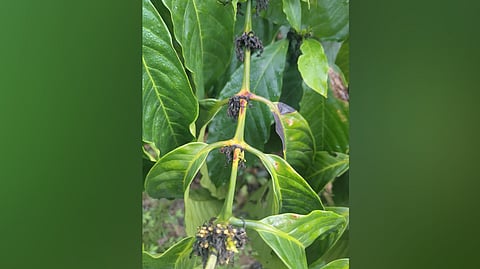

CHIKKAMAGALURU: Intense temperature coupled with heatwave has impacted coffee and areca crops in the plains of the Malnad region. With mercury level shooting up to 36 degrees Celsius, commercial crops like coffee, areca and pepper have been severely affected. With the adverse heat continuing to hit the region, unripe arecanuts that had just started to sprout, started dropping because of lack of moisture. Though the region witnessed pre-monsoon once or twice in Kalasa and Mudigere taluks, the heatwave that followed, nullified moisture, thus affecting the crops.
It was not just the arecanuts, the scorching sun and the burning heat have adversely affected sprouted coffee beans as well. Unripe beans blackened and died, thus cutting a major dip in the yield. Normally, planters prune the trees in the estate in January and February, soon after picking the coffee in November and December. Hence, coffee plants are exposed to heat and hot temperature and beans start to shrink and droop. Former Karnataka Growers’ Federation president B S Jayaram said, “There will be a drastic drop in the yield of coffee crops. If this weather continues, we cannot expect good prices next year too.”
“Price of the Robusta coffee has slightly spiked but it is grown in smaller amounts, when compared to Arabica coffee which is grown in large numbers, which is why the price of Arabica is not stable,” said coffee grower Beranagodu Mahesh. Another coffee planter Bhoje Gowda said, “It is better to postpone tree pruning in the coffee plantations as the sun’s rays fall on the exposed plants, thereby damaging them.” He further added that deficit rain, and the sun’s heat have curtailed the growth of pepper vines, and its leaves have begun to fade. Growers are anxious about the health of vines, and a probable drop in the prices in the coming year, he added. “Plantation workers are fatigued while working in the estates and are falling prey to illnesses. The only remedy is good showers,” many planters opined.